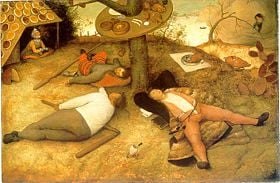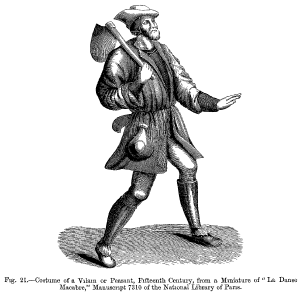Peasant
A peasant, from fifteenth century French païsant meaning one from the pays, the countryside or region, (from Latin pagus, country district) is an agricultural worker with roots in the countryside in which he or she dwells, either working for others or, more specifically, owning or renting and working by his or her own labour a small plot of ground, in England a "cottager."
Background
Peasants exist in a world before the modern division of labor: a peasant must be a jack-of-all trades, handy at everything. Peasants depend on the cultivation of their land; without stockpiles of provision they thrive or starve according to the most recent harvest (illustration, above right). Peasants live to agricultural time; the "world-time," in Fernand Braudel's term, of politics and economics does not directly affect the peasant. Peasants typically make up the majority of the ==V Though a word of not very strict application, once a market economy has taken universal root, it is now frequently used of the traditionalist rural population in countries where the land is chiefly held by smallholders, peasant proprietors.
In the great majority of pre-industrial societies, peasants constitute the bulk of the population, the authentic "silent majority." A rural peasant population differs enormously in its values and economic behavior from an urban worker population. Peasants tend to be more conservative than urbanites, and are often very loyal to inherited power structures that define their rights and privileges and protect them from interlopers, despite their generally low status within them.
Peasant societies generally have very well developed social support networks. Especially in harder climates, members of the community who have a poor harvest or suffer some form of hardship will be taken care of by the rest of the community. Loyalties and vengeance both run very deep. Peasant communities are extremely tight, and are often difficult to access or understand by outsiders.
Peasant societies can often have very stratified social hierarchies within them.
In a barter economy, peasants characteristically have a different attitude to work than peasants— or towndwellers— in a money economy would. Most of them are content to live at a subsistence level and will not expend unnecessary labour raising their standard of living. Traditionally many non-peasants have viewed this as laziness. However, it does make sense from their perspective, since there would rarely be any point in producing more than could be consumed.
Fernand Braudel devoted the first volume of his major work, Civilization and Capitalism 15th–18th Century to the largely silent and invisible world that existed below the market economy, in The Structures of Everyday Life.
Since the literate classes who left the most record tended to dismiss the peasants as figures of coarse appetite and rustic comedy, "peasant" may have a pejorative rather than descriptive connotation in historical memory. However, it was not always that way; peasants were once viewed as pious and seen with respect and pride. Life was hard for peasants, but before technology and a money economy created a chasm between rich and poor, life was hard for everyone. Society was theorized as organized in three "estates": those who work, those who pray and those who fight.
The position of the medieval European Peasant diverges
The relative position of Western European peasants greatly improved after the Black Death unsettled medieval Europe, granting far greater economic and political power to those peasants fortunate enough to survive the cataclysm. In the wake of this disruption to the established hierarchy, later centuries saw the invention of the original printing presses, widespread literacy and the enormous social and intellectual changes of the Enlightenment. This evolution of ideas in an environment of relatively widespread literacy laid the groundwork for the Industrial Revolution, which enabled mechanically and chemically augmented agricultural production while simultaneously increasing the demand for factory workers in cities. These factory workers with their low skill and easy replaceability quickly came to occupy the same socio-economic stratum as the original medieval peasants. The tension between the interests of these two groups forms an underlying context for much of the social and economic debate of the past century and a half. Unfortunately, much of this dialogue was exported to regions that were culturally very different from 19th/20th century Western Europe.
This is especially pronounced in Eastern Europe. Lacking any catalysts for sweeping change in the 14th century, the Eastern European peasants largely continued upon the original medieval path until the 18th and 19th centuries, when the tsars began to notice that the West had made enormous strides they had not. They responded by forcing the largely illiterate peasant populations under their control to embark upon a Westernization and industrialization campaign. Using methods of coercion and inept central planning that were largely continued by the later Communists, Peter the Great initiated a half-successful attempt to force 500+ years worth of social change in the space of a few generations. Although this approach eventually succeeded (under the Communists) in producing a technologically advanced and literate population, it came at the cost of many millions of lives and a cultural legacy that persists to this day.
Peasant Revolts
Peasant, Peasants' or Popular is variously paired with Revolt, Uprising and War and may refer to (sorted chronologically):
- Peasant revolt in Flanders 1323-1328
- English peasants' revolt of 1381
- Slovenian peasant revolt of 1515
- German peasants war of 1524-1525
- Croatian and Slovenian peasant revolt
- Swiss peasant war of 1653
- 1907 Romanian Peasants' Revolt
ReferencesISBN links support NWE through referral fees
- The Journal of Peasant Studies, 1973 to the present
- Braudel, Fernand, The Structures of Everyday Life vol I of Civilization and Capitalism
- Ladurie, Emmanuel Le Roy, Montaillou : The Promised Land of Error
- Mollat, Michael, The Poor in the Middle Ages, 1986.
- Kishlansky, Mark, Civilization in the West, fourth edition, 2001
External links
- Jerome Blum, Lord and Peasant in Russia From the Ninth to the Nineteenth Century (Princeton University Press, 1961).
This article incorporates text from the Encyclopædia Britannica Eleventh Edition, a publication now in the public domain.
Credits
New World Encyclopedia writers and editors rewrote and completed the Wikipedia article in accordance with New World Encyclopedia standards. This article abides by terms of the Creative Commons CC-by-sa 3.0 License (CC-by-sa), which may be used and disseminated with proper attribution. Credit is due under the terms of this license that can reference both the New World Encyclopedia contributors and the selfless volunteer contributors of the Wikimedia Foundation. To cite this article click here for a list of acceptable citing formats.The history of earlier contributions by wikipedians is accessible to researchers here:
The history of this article since it was imported to New World Encyclopedia:
Note: Some restrictions may apply to use of individual images which are separately licensed.



